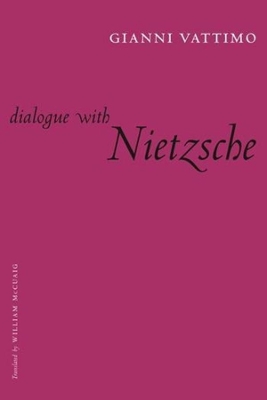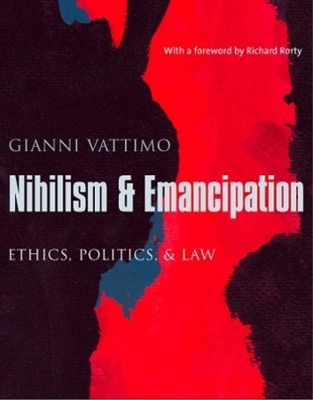European Perspectives: A Series in Social Thought and Cultural Criticism
2 total works
For more than forty years, Gianni Vattimo, one of Europe's most important and influential philosophers, has been a leading participant in the postwar turn that has brought Nietzsche back to the center of philosophical enquiry. In this collection of his essays on the subject, which is a dialogue both with Nietzsche and with the Nietzschean tradition, Vattimo explores the German philosopher's most important works and discusses his views on the Ubermensch, time, history, truth, hermeneutics, ethics, and aesthetics. He also presents a different, more "Italian" Nietzsche, one that diverges from German and French characterizations. Many contemporary French and poststructuralist philosophers offer literary or aesthetic readings of Nietzsche's work that downplay its political import. Shaped by the revolutionary tradition of 1968, Vattimo's interpretations take Nietzsche seriously as a political philosopher and argue for and defend his relevance to projects for social and political change. He emphasizes the hermeneutic aspect of Nietzsche's philosophy, characterizing the Nietzschean project as a political hermeneutics.
Vattimo also grapples with Heidegger, a philosopher who has had a profound influence on the interpretation and understanding of Nietzsche. Vattimo examines Heidegger's philosophy through its complex relationship to Nietzsche's, and he produces a Heideggerian understanding of Nietzsche that paradoxically goes against Heidegger's own readings of Nietzsche's work. Heidegger believed Nietzsche was the ultimate metaphysician; Vattimo sees him as the founder of postmetaphysical philosophy. Throughout these essays, Vattimo draws on and quotes extensively from fragments in Nietzsche's notebooks, many of which have never before been translated into English. His writing is clear, elegant, and accessible, and, for the first time, Vattimo's own intellectual developments, shifts, and continuities can be clearly discerned. The loyal testimony and unique perspective in Dialogue with Nietzsche makes a convincing case for another orientation in Nietzsche scholarship.
Vattimo also grapples with Heidegger, a philosopher who has had a profound influence on the interpretation and understanding of Nietzsche. Vattimo examines Heidegger's philosophy through its complex relationship to Nietzsche's, and he produces a Heideggerian understanding of Nietzsche that paradoxically goes against Heidegger's own readings of Nietzsche's work. Heidegger believed Nietzsche was the ultimate metaphysician; Vattimo sees him as the founder of postmetaphysical philosophy. Throughout these essays, Vattimo draws on and quotes extensively from fragments in Nietzsche's notebooks, many of which have never before been translated into English. His writing is clear, elegant, and accessible, and, for the first time, Vattimo's own intellectual developments, shifts, and continuities can be clearly discerned. The loyal testimony and unique perspective in Dialogue with Nietzsche makes a convincing case for another orientation in Nietzsche scholarship.
A daring marriage of philosophical theory and practical politics, this collection is the first of Gianni Vattimo's many books to combine his intellectual pursuits with his public and political life. Vattimo is a paradoxical figure, at once a believing Christian and a vociferous critic of the Catholic Church, an outspoken liberal but not a former communist, and a recognized authority on Nietzsche and Heidegger as well as a prominent public intellectual and member of the European parliament. Building on his unique position as a philosopher and politician, Vattimo takes on some of the most pressing questions of our time: Is it still possible, long after Nietzsche proclaimed the death of God, to talk of moral imperatives, individual rights, or political freedom? Are these values still relevant in today's world? Tackling these crucial issues, Gianni Vattimo argues that nihilism is not the absence of meaning but a recognition of a plurality of meanings; it is not the end of civilization but the beginning of new social paradigms.
Commonly associated with the pessimistic belief that all of existence is meaningless, nihilism, as a philosophical principle, is far less sensational-it is the ethical doctrine that there are no moral absolutes or infallible natural laws, that "truth" is inescapably subjective. Because the conditions for equality and liberty are not "naturally" given, society must actively create these ideals or it will inevitably fall prey to irrationality, prejudice, and oppression. Vattimo contends that the infighting, timidity, and confusion that have overtaken contemporary liberal thought and politics are the products a prolonged and indulgent mourning over the loss of the transcendental father figure-any institution or power structure that defines truth, knowledge, and reality. Until humanity overcomes its need for external authority-whether it be organized religion, the nation-state, or free-market capitalism-emancipation will remain unattainable. Collecting fourteen of Vattimo's most influential essays on ethics, politics, and law, Nihilism and Emancipation is a provocative reevaluation of meaning, values, and the idea of freedom in Western culture.
Commonly associated with the pessimistic belief that all of existence is meaningless, nihilism, as a philosophical principle, is far less sensational-it is the ethical doctrine that there are no moral absolutes or infallible natural laws, that "truth" is inescapably subjective. Because the conditions for equality and liberty are not "naturally" given, society must actively create these ideals or it will inevitably fall prey to irrationality, prejudice, and oppression. Vattimo contends that the infighting, timidity, and confusion that have overtaken contemporary liberal thought and politics are the products a prolonged and indulgent mourning over the loss of the transcendental father figure-any institution or power structure that defines truth, knowledge, and reality. Until humanity overcomes its need for external authority-whether it be organized religion, the nation-state, or free-market capitalism-emancipation will remain unattainable. Collecting fourteen of Vattimo's most influential essays on ethics, politics, and law, Nihilism and Emancipation is a provocative reevaluation of meaning, values, and the idea of freedom in Western culture.

